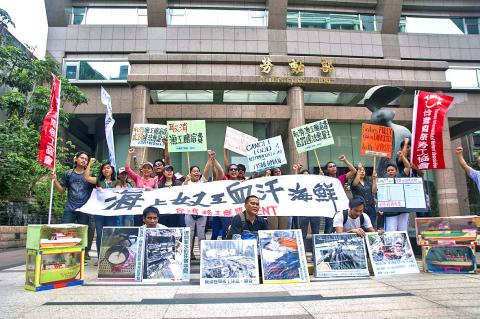Civil groups and scores of migrant fishermen rallied in front of the Ministry of Labor headquarters in Taipei yesterday, saying their employers have improperly docked money from their salaries and comparing their working conditions to slavery.
Protesters and migrant fishermen, mostly Filipinos, performed a skit and shouted slogans in different languages, demanding free accommodation and direct payment of salaries for migrant fishermen.
Taiwan International Workers’ Association researcher Wu Jing-ru (吳靜如) said many migrant fishermen have NT$5,000 deducted from their pay per month for onboard accommodation, as employers are allowed to provide lodging or other benefits worth up to NT$5,000 in lieu of the full minimum wage, according to the Labor Standards Act (勞基法).

Photo: CNA
The onboard lodging is not worth the money, but migrant workers — who usually earn the minimum wage — have to pay for it as well as brokerage fees, making their real wage much lower than the minimum, Wu said.
A Filipino fisherman using the name Joel said he could not sleep in the fishing boat he works on because the crew’s cabin is too hot and noisy due to its proximity to the engine, forcing him to sleep on a makeshift bed of cardboard on deck.
During a six-day layover due to a typhoon, he and another crew member were given only NT$500 for dining expenses, and they had to pick fruit on a nearby mountain to survive, Joel said.
Another fisherman, who gave his name as Joeril, said his captain limits water use and does not allow crew to do laundry onboard, while giving them only rice porridge for breakfast.
Wu said that human resource agencies often concoct various excuses to deduct migrant fishermen’s salaries, such as exacting brokerage fees, but listing the payment as “mortgage,” and forcing workers to sign a “mortgage contract” with the agencies’ subsidiaries registered in migrant workers’ countries of origin.
The ministry has been negligent by failing to conduct any inspections over such practices, Wu said, adding that it claims that the docking of pay — as it is a “mortgage” made between foreign workers and foreign-registered firms — is regulated by the labor exporting nation, instead of recognizing the practice as a breach of the act.
According to the ministry’s Foreign Workers Living and Caring Service Planning Book (外國人生活照顧服務計畫書), employers of migrant workers are required to provide accommodation that meets the workers’ needs, but the ministry has failed to ensure the implementation of the rule, Wu said.
Vietnamese Catholic priest Peter Nguyen Van Hung said that Vietnamese migrant fishermen faced a similar plight before they were blocked from working in Taiwan in 2004, with the situation remaining unchanged for years.
Ministry Senior Executive Officer Hou Song-yen (侯松延), who accepted the protesters’ petition, said it is legally permissible for employers to provide accommodation in lieu of payment, but added that the ministry would look into the protesters’ claims to determine whether there is any illegal activity going on.
The ministry is yet to conduct an inspection of the fishing industry due to its unique working patterns, Hou said, adding that it is the Fisheries Agency’s duty to inspect working conditions of fishing vessels operating outside Taiwan’s territorial waters.

Chinese Nationalist Party (KMT) Chairman Eric Chu (朱立倫), spokeswoman Yang Chih-yu (楊智伃) and Legislator Hsieh Lung-chieh (謝龍介) would be summoned by police for questioning for leading an illegal assembly on Thursday evening last week, Minister of the Interior Liu Shyh-fang (劉世芳) said today. The three KMT officials led an assembly outside the Taipei City Prosecutors’ Office, a restricted area where public assembly is not allowed, protesting the questioning of several KMT staff and searches of KMT headquarters and offices in a recall petition forgery case. Chu, Yang and Hsieh are all suspected of contravening the Assembly and Parade Act (集會遊行法) by holding

PRAISE: Japanese visitor Takashi Kubota said the Taiwanese temple architecture images showcased in the AI Art Gallery were the most impressive displays he saw Taiwan does not have an official pavilion at the World Expo in Osaka, Japan, because of its diplomatic predicament, but the government-backed Tech World pavilion is drawing interest with its unique recreations of works by Taiwanese artists. The pavilion features an artificial intelligence (AI)-based art gallery showcasing works of famous Taiwanese artists from the Japanese colonial period using innovative technologies. Among its main simulated displays are Eastern gouache paintings by Chen Chin (陳進), Lin Yu-shan (林玉山) and Kuo Hsueh-hu (郭雪湖), who were the three young Taiwanese painters selected for the East Asian Painting exhibition in 1927. Gouache is a water-based

Taiwan would welcome the return of Honduras as a diplomatic ally if its next president decides to make such a move, Minister of Foreign Affairs Lin Chia-lung (林佳龍) said yesterday. “Of course, we would welcome Honduras if they want to restore diplomatic ties with Taiwan after their elections,” Lin said at a meeting of the legislature’s Foreign Affairs and National Defense Committee, when asked to comment on statements made by two of the three Honduran presidential candidates during the presidential campaign in the Central American country. Taiwan is paying close attention to the region as a whole in the wake of a

OFF-TARGET: More than 30,000 participants were expected to take part in the Games next month, but only 6,550 foreign and 19,400 Taiwanese athletes have registered Taipei city councilors yesterday blasted the organizers of next month’s World Masters Games over sudden timetable and venue changes, which they said have caused thousands of participants to back out of the international sporting event, among other organizational issues. They also cited visa delays and political interference by China as reasons many foreign athletes are requesting refunds for the event, to be held from May 17 to 30. Jointly organized by the Taipei and New Taipei City governments, the games have been rocked by numerous controversies since preparations began in 2020. Taipei City Councilor Lin Yen-feng (林延鳳) said yesterday that new measures by